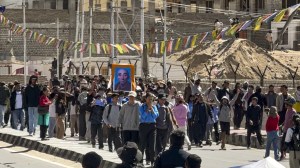Political top brass skip Patel’s birth anniversary
NEW DELHI, OCT 31: There were no more than a dozen people in Parliament's Central Hall today to offer tributes to Sardar Patel on his 125t...

NEW DELHI, OCT 31: There were no more than a dozen people in Parliament’s Central Hall today to offer tributes to Sardar Patel on his 125th birth anniversary. Neither Prime Minister A.B. Vajpayee, nor Home Minister L.K. Advani — billed as the modern-day Sardar — were present. Murli Manohar Joshi, Leader of Opposition Sonia Gandhi and Lok Sabha Speaker G.M.C. Balayogi, all absented themselves. Not even Deputy Speaker P.M. Sayeed chose to be present.
Parliament still makes it a point to observe the birth anniversary of the country’s heroes, whose portraits adorn its walls, and the invitations are normally sent out by the office of the Lok Sabha Speaker. They are sent, among others, to members of the Inter-Parliamentary Group that comprises both MPs and ex-MPs.
Today, Rajya Sabha Vice-Chairman Najma Heptullah led the embarrassingly small group in making floral offerings to the portrait of the Iron Man of India. There were only four ministers — Ram Naik, Jayawantiben Mehta, Sumitra Mahajan and Balasaheb Vikhe Patil — present from the BJP, which has tried to coopt Patel’s legacy, and an equally small number representing Congress — Manmohan Singh, Ahmed Patel, Suresh Pachauri, and Anil Shastri — that forgot the Sardar a long time ago.
As if to compensate for the absence of people on the occasion, Najma Heptullah got a group of school children, who had come to see the Parliament House, to file past the portrait of the man hailed as the unifier of India. But for him, India might not have been a nation today.
That this should happen hours and days before the three new states of Chhatisgarh, Uttaranchal and Jharkhand are to take birth, added an irony to the situation.
It was Sardar Vallabhbhai Patel who had integrated 600 small princely states into the new democratic constitution of India after the transfer of power in 1947, merging them into existing provinces or into new centrally administered units. He started an integrative process, and princely states like Kota, Boondi, Jhalawar and Sirohi became East Rajasthan; Junagadh, Jamnagar and others joined together to form Saurashtra; Gwalior, Indore, Bhopal, Vidisha, Ujjain, Khandwa banded into Madhya Bharat.
The process continued with the reorganisation of the states in 1956. Madhya Bharat joined with a chunk of CP and Berar, Vindhya Pradesh and a part of Bundelkhand to form Madhya Pradesh. And today, the reverse is taking place. Chhatisgarh is breaking away from this very unit, ironically on the same day as Madhya Pradesh came into existence 44 years ago.
About 10 feet away from Patel’s portrait sat a group of politicos discussing Operation Topple that has already been put into motion in Chhatisgarh, even before the new Chief Minister Ajit Jogi took the oath of office.
Samata Party leader and Minister of State for Railways Digvijay Singh, was rushing to Raipur this evening, hours after D.N.Sahay, who belongs to the Samata Party, was installed as the Governor of Chhatisgarh, unexpectedly piping to the post an RSS nominee.
They sat and analysed the choice of Jogi in the context of power struggle in the Congress; that Sonia Gandhi had to assert with her choice — and Jogi is clearly perceived as her man — now that her authority has been challenged by Jitendra Prasada; that Moti Lal Vora’s election as Chief Minister would have been seen as Madhavrao Scindia’s victory; that Vidya Charan Shukla’s elevation would have been viewed as a weakening of the High Command.
There was poignancy in the whole situation as these people sat at the feet of a man who, for all his differences with Nehru, and within hours of Gandhi’s assassination, had declared: “Jawahar is my leader”, in keeping with a promise he had given Gandhi an hour before the latter was shot dead, that he would work with Nehru. It was a statement he had refrained from making while Gandhi was alive. But for his magnanimous words, India could have fallen apart.
And yet the country and those who represent it have now no time — and little use — for him. The times have truly changed.





- 01
- 02
- 03
- 04
- 05


























